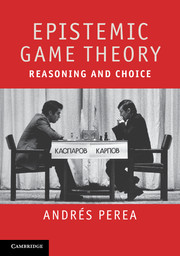Book contents
- Frontmatter
- Contents
- List of figures
- List of tables
- Acknowledgments
- 1 Introduction
- Part I Standard beliefs in static games
- Part II Lexicographic beliefs in static games
- 5 Primary belief in the opponent's rationality
- 6 Respecting the opponent's preferences
- 7 Assuming the opponent's rationality
- Part III Conditional beliefs in dynamic games
- Bibliography
- Index
7 - Assuming the opponent's rationality
Published online by Cambridge University Press: 05 July 2012
- Frontmatter
- Contents
- List of figures
- List of tables
- Acknowledgments
- 1 Introduction
- Part I Standard beliefs in static games
- Part II Lexicographic beliefs in static games
- 5 Primary belief in the opponent's rationality
- 6 Respecting the opponent's preferences
- 7 Assuming the opponent's rationality
- Part III Conditional beliefs in dynamic games
- Bibliography
- Index
Summary
Assuming the opponent's rationality
In the previous chapter we discussed the idea of respecting the opponent's preferences, which states that you deem an opponent's choice a infinitely more likely than some other choice b whenever you believe that the opponent prefers a to b. That is, you deem a better choice infinitely more likely than a worse choice, even if you believe that both choices are not optimal for the opponent. Various examples illustrated that this idea may put severe restrictions on your lexicographic belief – not only on your primary belief but also on your secondary and higher-level beliefs. And these restrictions – we saw – may be crucial for the eventual choice you make in a game.
The concept of respecting the opponent's preferences is just one reasonable condition we may impose on a lexicographic belief, but it is certainly not the only one. To illustrate this, let us return to the example “Spy game” we introduced in the previous chapter.
Example 7.1 Spy game
Recall the story from Example 6.5. For convenience, we have reproduced the utilities for you and Barbara in Table 7.1. As we have seen, common full belief in “caution and respect of preferences” leads you to choose pub c. In a nutshell, the reasoning was as follows: It is clear that Barbara prefers pub a to pub b. Hence, you must deem the event that Barbara will visit pub a infinitely more likely than the event that Barbara will visit pub b if you respect her preferences. This, in turn, implies that you will prefer pub b to pub a.
- Type
- Chapter
- Information
- Epistemic Game TheoryReasoning and Choice, pp. 301 - 344Publisher: Cambridge University PressPrint publication year: 2012



